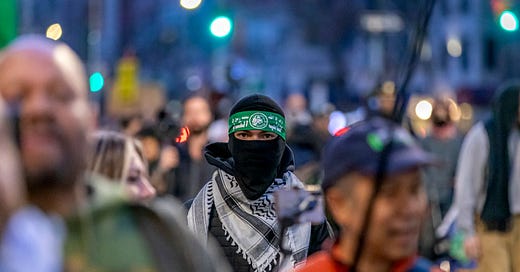
Since the October 7 massacre, a small “charity” based in Canada has been ubiquitous on elite college campuses, celebrating the bloodbath at public rallies and seminars. The group is called Samidoun, and it claims to be an NGO advocating on behalf of Palestinian prisoners in Israeli prisons.
On Tuesday, the U.S. and Canadian governments put an end to that charade.
Samidoun is not a charity at all. Rather, it’s a group “that serves as an international fundraiser for the Popular Front for the Liberation of Palestine (PFLP) terrorist organization,” according to a press release issued Tuesday by the Treasury Department. The government describes it as a “sham.”
For anyone who has followed the history of Palestinian terrorism, PFLP is a name you’re no doubt familiar with. It was founded in 1967 as a Marxist revolutionary group, and was supported during the Cold War by China and the Soviet Union. In 1976, the PFLP teamed up with West Germany’s Baader-Meinhof group to hijack a flight from Tel Aviv, Israel, to Entebbe, Uganda, separating Jewish and non-Jewish passenger hostages. Eventually, Israeli commandos freed the hostages. The episode was turned into the movie 7 Days in Entebbe.
For most of the 1990s and 2000s, PFLP was largely an afterthought for both Israelis and Palestinians (though it did murder an Israeli tourism minister in 2001). That began to change in 2019, when the PFLP killed a 17-year-old girl in the West Bank with a roadside bomb that also injured her father and brother. Since then, the government of Israel has pressed its allies to designate Samidoun as a terrorist front for the PFLP. The designations from Canada and the U.S. on Tuesday are the culmination of that effort.
One place where that designation will have an effect is elite campuses, where Samidoun has long established itself as a partner—and funder—for anti-Israel student initiatives. Just in the past year, Samidoun has co-sponsored a divestment rally at Princeton, taught an “Abolish Imperialism” lecture at Harvard Law School and, most infamously, led a “Palestinian Resistance 101” teach-in at Columbia University that resulted in the suspension of multiple student organizers who used the event to “promote the use of terror or violence.”
As far back as 2017, Princeton’s Palestine club shared links from Samidoun’s media page and encouraged students to work with the group on initiatives to free a Palestinian activist who had assaulted an Israeli soldier. In 2022, Princeton’s Palestine club again partnered with Samidoun to lead a “Palestinian Prisoner Letter-Writing Session” on campus. This long and close relationship between Princeton students and faculty and Samidoun has been replicated at top universities across the country.
Matthew Levitt, a senior fellow at the Washington Institute for Near East Policy and a former FBI analyst and deputy assistant secretary of the Treasury Department, told The Free Press that the U.S. and Canadian governments have debated over the last year about designating Samidoun a terrorist group. Their reservation was due to the fact that Western governments do not sanction organizations based just on violent and hateful speech. “They have been saying horrible and nasty things,” Levitt said. “We don’t designate people for saying nasty things.”
What turned the tide, according to Levitt, was that Israel had accumulated mounds of evidence that Samidoun was, in effect, a fundraising arm for the PFLP. Some of this information has been available for some time. For example, Israel’s Ministry of Strategic Affairs and Public Diplomacy released a report in 2019 that detailed Samidoun’s role in raising money for the PFLP. That report claims that PFLP operatives transferred money from Lebanon to a man named Khaled Barakat when he was living in Europe. On Tuesday, Barakat was also designated as a foreign terrorist financier. His wife, Charlotte Kates, is Samidoun’s “international coordinator.”
In 2022, the Netherlands barred Kates and Barakat from entering the country where they had planned to land and then drive to a pro-Palestine march in Belgium. More recently, Germany designated Samidoun as a terrorist organization in November 2023.
Even though PFLP has not captured the headlines of better-known groups like Hamas or Hezbollah, it remains deadly. Although it was not involved in the original planning for October 7, the terrorist group joined the massacre once it was underway. NGO Monitor has published PFLP statements and Telegram posts that show its participation in the 2023 attack, joining after the first wave of Hamas operatives.
Eli Lake is a columnist for The Free Press. Follow him on X @EliLake and read his piece “The Spy Who Lied To Us.” Danielle Shapiro, a senior at Princeton, is a Free Press fellow.
To support more of our work, become a Free Press subscriber today:















who got arrested?
Saw a vid recently of Charlotte Kates, one of the leaders of this cult. "She" (based on her name, not appearance) is exactly what you'd expect: a grotesquely overweight, shaved-headed, wild-eyed, gibbering cretin. The anti-Israel mob is a magnet for the rejects of society.